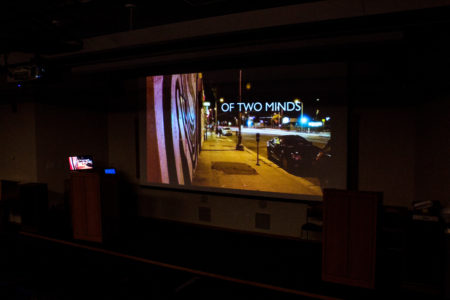
Grinnell’s student run organization Active Minds hosted a showing of the documentary “Of Two Minds,” which highlights people who live with bipolar disorder, last Sunday, Nov. 6.
Directed by Douglas Blush and Lisa J. Klein, the film shows in intimate detail the personal lives of several people who live with bipolar disorder. It also includes interviews from their loved ones, who describe the effects of bipolar disorder on their lives as well.
Active Minds Outreach Chair Nina Galanter ’18, said the documentary was chosen for the showing because mental health stigma on campus can be reduced by educating students about potentially unfamiliar disorders.
“One of our main goals is to reduce stigma and raise awareness of its effects. I think bipolar disorder is something people are potentially a lot less familiar with, so there is a lot more stigma about it,” Galanter said.
As the film follows the lives of six people who suffer from bipolar disorder for several years, the effect of the stigma surrounding the disorder becomes painfully clear. All of the subjects talk about the constant necessity of “acting normal” or “playing sane” during their daily lives, fearing the judgments their peers and friends may develop if they do not.
“Take the best day you ever had and multiply it by a million,” one person says about manic episodes. “[Depressions are] like a flu but 100 times worse. It’s having flu in your mind.” Another subject added, “When you are at the height of mania, before it becomes psychosis, you feel like God.”
Understanding bipolar disorder entails understanding that this disorder does not define a person. The main subjects of the documentary are all creative; they are writers, painters, architects, performers and musicians. Each of them is shown incorporating their experiences with the disorder into their art in some way.
Another aspect that the documentary covers is treatment. One subject noted that he does not take his medication because it robs him of his creativity; another describes the same effect, but says the benefits of medication outweigh its costs. One woman spends 700 dollars every month on medication because she can no longer find an insurance company willing to cover her.
Bipolar disorder is often triggered by an event or a stressful period of time, but sometimes the cause is unclear. Some of those highlighted in this documentary often contemplate how much of the disease was caused by their personal histories. Some are able to identify traumatic events, including rape, as the event that triggered their illness, while others believe they have always suffered from the disorder, or that it emerged without an apparent cause.
Active Minds Administrative Chair Sam McDonnell ’17 stated that the documentary, through its educational and yet personal portrayal of the disorder, may help viewers understand those suffering from bipolar disorder better.
“Maybe watching this movie has the effect of making people a little more empathetic to people who might be experiencing this mental illness,” McDonnell said.
To continue this conversation, Active Minds is planning to give students who have experienced mental health stigma an opportunity to share their stories. Anonymity is definitely an option.
“We will have an event soon in Bob’s, like an open-mic style thing, where people can talk about their experiences with mental health stigma. We’d love people to come to that and also submit their stories to us. It can be anonymous, if they’d like,” McDonnell said.

















































